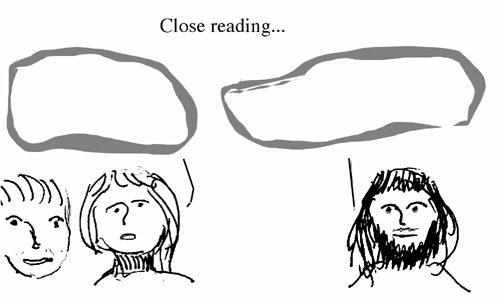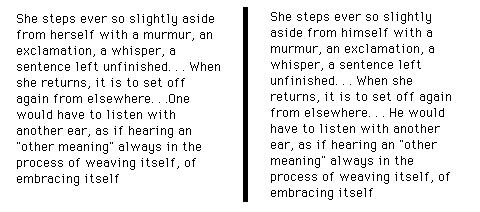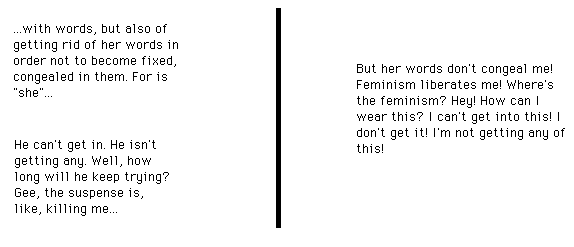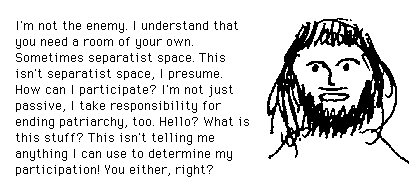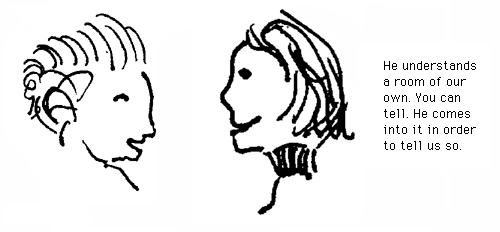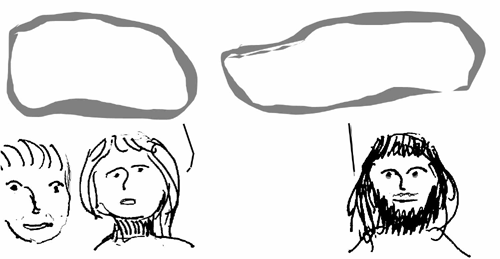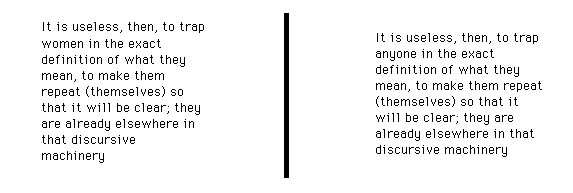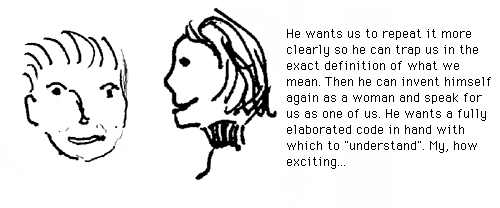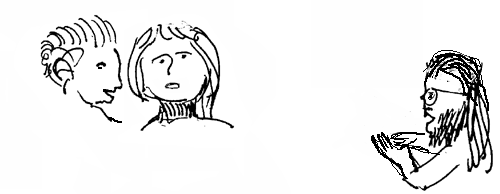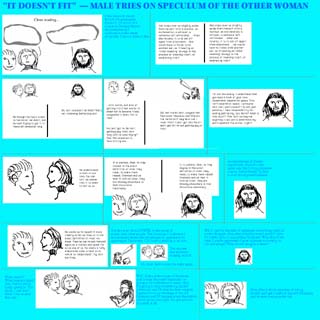
Feminist literary criticism is one of feminism's success stories. Probably
nowhere else in the academy have feminists enjoyed anywhere near the internal
success at transforming a patriarchal discipline, dethroning its masculinist
tenets, and placing women's thinking, writing, experience, and theory in
a position of comparable importance. In part, this may be due to the fact
that women have long tended to pursue their academic careers in English
literature, so when feminist concepts and politics began making major social
waves, which both affected and included the activities and perceptions of
women university students, the discipline of English must have found its
stodgy collective self up to its metaphorical eyeballs in feminist challenges
from its students. Since literary criticism tends to inscribe canonical
excellence to its most favored texts by process of conjectural inquiry,
thus offering up new readings that reveal new layers of meaning in their
tapestries, to successfully enter the female-authored text and use women's
questions to reveal fascinating weaves of meaning and intricate complexities
of relationships between the layers there is to have succeeded--one need
not be able to reach a set of widely agreed-upon Correct Readings of Toni Morrison's Beloved in order to
successfully direct critical attention to it. Poststructuralist theory has
eliminated the "door" problem and women's work and women's inquiry
are no longer missing in action in the English department, which is not
the case in most other disciplines at this point. But, as the still-very-marginalized
feminist thinkers in those other disciplines continue to attempt to accomplish
something comparable, we find ourselves increasingly operating in an environment
where feminist theory is understood to be poststructuralist, and where to
engage ideas and assertions with feminist questions and critical analysis
that derives from other varieties of feminist theory is to find ourselves
corrected for not doing feminism properly. The poststructuralist version
of feminist theory is now privileged in academia generically because it
has been established as legitimately academic in one of the disciplines,
and when its proponents lose sight of the local and utilitarian reasons
that they chose this particular tool for doing the feminist project within
literary criticism, their claiming of poststructuralist feminism as feminism
combines with their comparably privileged position as "winners"
so that their voice alone is heard. There are consequences to this...
Poststructuralist theory (feminist and otherwise) seems to me to work from
a disavowal of the expressible knowability of the content of the world,
and, as I said in the beginning of the previous section, to make precious
few direct assertions. Its proponents, those who ascribe to it, tend to
think of it as a tool rather than a paradigm of reality. The most favored
topics of discussion within the poststructuralist medium seem to be discourses--how
arguments are constructed, how versions of reality are enscribed, how arguments
are won. In practice, I've often found (to my annoyance) that proponents
of poststructuralist theory are not bothered by their own inconsistency
with their own theories: for example, the Director of the Women's Studies
Program who has invited me to leave the program does not seem bothered by
the traditional academic notions of "rigor", i.e, standards having
to do with how well one performs in the classroom or the program; nor does
she apply the poststructuralist critique of "canon" to the body
of nonfiction called "text", and instead has major problems with
my anarchic predisposition towards the authority of teacher, program, text,
and standards of academic excellence as they could ever be "rigorously"
(rigidly) rendered in words.
Poststructuralist feminism has a greater emphasis
on the possible locations of patriarchal oppression of women, and comes
closer to asserting that everything is polluted with patriarchal dynamics--yes,
a greater emphasis on that than radical feminism, which in contrast must
look like a lot of Pollyanna Good Ship Lollypop chirpings about sisterhood
and experience and women can change the world and woman is strong, invincible,
and can't be stopped. This is a somewhat disconcerting situation to be in
for a radical feminist, because radical feminists have always been the ones
who were accused of going TOO far in seeing patriarchal oppression embedded
in virtually every social institution. Poststructuralist feminism emphasizes
the negation of authority that stands in opposition to the feminist projects
and which maintains the patriarchal world. Reciprocally, radical feminism
has a greater emphasis on deconstructing certain binary differences that
remain inscribed within poststructuralist feminism, especially the binary
categories of agency and subjection-to-external-phenomena; personal and
political; conscious and unconscious. Radical feminism emphasizes the generation
of authority of feminists themselves to engage in feminist projects and
transform the world. Poststructuralist feminism works from negasis, radical
feminism from genesis.
Admittedly, in many ways, the two theoretical perspectives are describing
many of the very same phenomena, and feminists have usually been justifiably
suspicious of the patriarchal thinking tendency towards division and isolation,
"fixation and dismemberment" (Daly
1978), and especially so when it comes to dividing women from women.
To complain about binary categories in poststructuralist feminism while
arguing single-mindedly that it is entirely a conceptual Other and that
the feminists doing it are all doing the Wrong kind of feminism is not in
keeping with radical feminism's or poststructuralist feminism's best traditions
and practice.
Speaking of practice, though, this itself is another space in which poststructuralist
feminists often seem to be implicitly invoking a binary split between paradigmatic
theory and utilitarian practice, as illustrated by Weedon's book title Feminist
Practice and Poststructuralist Theory (1987)
and being apparent in Scott's previously
quoted assertion that feminism needs a theory in order to accomplish
its desired practice, which is known to her before the theory has been chosen.
Within poststructuralism, practice is privileged while theory is a tool
deployed by it.
That's where my central warning comes in. Poststructuralist feminists have
an attitude towards their own theory somewhat like this, if you'll pardon
the totalization once again: "This is a good theory, because if I 'believe'
it, look at what I can justify doing, and my opponents can't argue against
it because it is a powerful argumentative tool."
But theory is practice! It immediately models the world in its assertions
of What Is So, and when academic feminists enscribe poststructuralism's
theoretical tenets as feminist, those assertions become feminist assertions
which can be used by anyone to discuss feminism. The content engages the
world in a process that yields a product, and process and its consequences
must remain concerns for the responsible theorist.
The process of my first engagement with this particular content produced
alienation, confusion, and distaste. Even before I had a strong sense of
what the overall assertions were, I was reacting to the language, I guess,
and I found it unpleasant, inelegant in my head. Far worse than most theoretical
writing, poststructuralist theory is often horrendously ugly and clunky
and alienating to the reader. It manages to be painstakingly nitpicky in
its nuancing while at the same time opaque about its assumptions, and sometimes
everything seems to run in passive voice with nouns verbing their way around
with no visible means of intentionality anywhere in sight. However, lest
I be confused with anti-intellectuals who are dismayed at the thought of
having to hold in their minds the string of concepts and images which longer
and more intricate sentence structures can weave, or give the impression
that I bear a grudge against hyphen-linked ultraspecific metamodifiers or
neologisms constraining the reader's thoughts in new and unusual patterns
by means of innovative suffixmongering and parapolitical mod/if/ication
of textual appEARance and/or the use of slash marks to convey concurrence/ambivalence
(or even the parenthetical remark), I want to make it plain that that is
not my complaint. Ugly writing doesn't just mean that the sentences are
long and full of Big Words, any more than Dick and Jane inanities represent
pretty wordsmithery. I'm not going to make any attempt to define pretty
versus ugly writing--indeed, the esthetic is preverbal and preanalytical,
and to define it would be to replace it with a dead formulaic criterion
for excellence--but I find writing such as this to be ugly:
Ironically, Zihlman reproduced a modernist humanist discourse featuring
a troubling universal being, woman the gatherer, who threatened to subdue
the heteroglossia of women's power-differentiated lives by means of the
univocal language of sisterhood, while Hrdy delineates a map of proliferating
differences written in to the primate female body that might indicate directions
for a postmodernist, decolonizing biopolitics.
(Haraway, 1990, p. 141)
A new social ensemble superior to the nation has thus been constituted,
within which the nation, far from losing its own traits, rediscovers and
accentuates them in a strange temporality, in a kind of "future perfect",
where the most deeply repressed past gives a distinctive character to a
logical and sociological distribution of the most modern type.
(Kristeva, 1981, p. 443)
The reader is assaulted by the form of these assertions, which are shaped
according to one of the Argumentative principles of rhetoric: they are difficult
to argue against in the first place because they are hard to understand.
In a world where one of the biggest problems for feminist theorists is that
people are not familiar with our concepts and ideas, one has to wonder about
their intended audience.
Following up on the feeling-level sense of distaste that I got from a significantly
large portion of the poststructuralist feminist theory, I studied matters
and looked at patterns and eventually brought out my analytic knife: there
is no presence in most of this theory of anyone in the center of the landscape
sorting the sand. There is no sense
of "I think", or "I feel", or "Well, after reading
such-and-such, I found myself wondering this and that, which led me to think
that...". Everything comes driving in with the pompous authority of
the "Is" assertion. The gaze Is male. The subject Is constructed.
The desire Is cathected. The author, who is wielding the pen/knife and cutting
up meaning into words and concepts and images, isn't explaining how these
things were concluded. Of course, no one would want to be confined to having
to explain how every notion or assertion was reached, because that would
prevent you from ever having a starting point, but feminist theorists should
have a sense of their audience, and poststructuralist feminist writers too
often write as if the audience were to be composed of poststructuralists,
semioticians, and psychoanalysts, and in those schools of male thought,
if you follow them backwards, there is precious little explanation of where
the theoretical ideas came from. They are ideas without experiential mothers.
The pompous "Is" statement is par for the course in the history
of those discourses, in contrast to which feminist theory in general has
been written around a tradition of de-mystification of theorization processes
(e.g., Johnson 1987). It
is hard to argue against a closed package of internally consistent assertions
when the person making those assertions is missing from the landscape, creating
the impression that this knowledge is intrinsically "out there".
The content being asserted with such authority is, paradoxically, the knowledge
of the truth that there is no Truth, the objective face-the-facts position
that there is no Position from which Facts can be faced. The process of
that content is to shift the focus from what one is asserting to how one
came to be making that particular deconstructable assertion.
It's a great tool for entering a locked room. It is hard to justify keeping
you out of a discourse when you have this tool in your hand. It negates
positions by destroying their authority. But the room is no longer the same.
The only Truth that can now be spoken is the truth of the importance of
winning discursive argument. Ultimately, there is an inconsistency here
between poststructuralism-inspired practice and poststructuralist theory,
and it threatens to bring down the whole structure of its endeavor in a
massive implosion.
Poststructuralism appeals to the democratic impulse in all of us in its
assertion that there is no single, unitary truth, but rather a plethora
of multifaceted, pluralistic truths from which it is impossible to privilege
one over another, and that to attempt to do so, to ensconce one person's
truth or one people's value system as Truth, is inherently imperialistic.
To assert that there can be no meaningful winner in such a marketplace because
there is no such thing as a "better" perspective, because one's
notions of "betters" are always completely socially constructed
or "always already overdetermined" by their social and temporal
location in the world, appeals to the post-humanist anti-capitalist sense
of fairness of many a person's social conscience. This is not, however,
the same as to assert that excellence, or truth, or the Good and Ideal defy
definition and can never be accurately and meaningfully put into words.
It is one thing to say, as Robert Pirsig does (1974), that
Quality is shapeless, formless, indescribable. To see shapes and forms
is to intellectualize. Quality is independent of any such shapes and forms.
The names, the shapes and forms we give Quality depend only partly on the
Quality. They also depend partly on the a priori images we have accumulated
in our memory. . .. . .In our highly complex organic state we advanced organisms
respond to our environment with an invention of many marvelous analogues.
We invent earth and heavens, trees, stones and oceans, gods, music, arts,
language, philosophy, engineering, civilization and science. We call these
analogues reality. And they are reality. . .But that which causes us to
invent the analogues is Quality. Quality is the continuing stimulus which
our environment puts upon us to create the world in which we live. All of
it. Every last bit of it. Quality cannot be defined. If we do define it
we are defining something less than Quality itself.
(p. 224-225)
It is another thing entirely to say that quality itself is the product of
one's social environment, and that the "names, shapes and forms"
we give to quality depend exclusively on the socially shared (and expected
to be shared) analogues of reality that we are culturally conditioned to
accept. Robert Pirsig can say that he is writing here of something that
is good and truthful and meaningful even though his writing is only one,
imperfectly rendered way of attempting to capture it in words. The poststructuralists
behave similarly, as if they can declare for the quality of the poststructuralist
position--that meaning is multiple and plural--over that of someone else
who tries to argue that their taste in politics or music are better than
someone else's. But according to their own theoretical matrix, they cannot
make that claim. If I'm an assertive Nazi who wants orderly sameness and
the reinstitutionalization of Propositional definitions of truth and goodness,
and you're a nice pluralistic multifaceted poststructuralist, you're in
no position to say that I cannot say these things, because that is only
true according to your socially constructed understandings of truth and
meaning, and if you're "right", you're not right because there
is no right and therefore my Nazi attitudes and assertions of knowable
standards of right and wrong have to be welcomed among the multifaceted,
pluralistic notions that get to play in the anarchic, free-wheeling discourse
of ideas that have no inherent quality one way or the other. Welcome to
hell.
e.g. --
There is no truth, just your truth and my truth and his truth and her
truth and you can't speak for all women and what is a woman anyway but a
social construct? And you can't speak meaningfully from your own experience
after all because all experience is socially constructed, too, and everything
is "already overdetermined" by the way that language belongs entirely
to men, so if women use words they are speaking men's ideas with men's tongues
so that isn't valid, so therefore what feminists ought to do is practice
being mad, invent a new language that deliberately doesn't make sense because
making sense is being trapped in the male discourse. There is no agency,
only the abject powerlessness of the individual to do anything but be perpetually
constructed by the discourse. And death of the subject, let's not forget
death of the subject. You aren't here.
Truth? Ha ha ha ha, whose truth? Canon? According to whom? Anything goes
if you know how to make it go. Standards are not merely relative, they are
arbitrary and related only to whoever is most effective in establishing
their own. Purity, accuracy, knowledge, wisdom, meaning? Yeah, right! Sure...look,
it is all power, the only thing is power, excellence is whatever those who
have the power to define excellence define as excellence. Therefore there
is no particularly good reason to listen to anybody out of any sense that
there is any sense out there. You know what it is about now-why listen to
anything or anybody unless it seems to be directly facilitating your political
and economic potential? I'm telling you, it's a dog eat dog world.
Worried about the canon? Hey, the poststructuralist feminists are right
on target. Shakespeare is definitely NOT better than Toni Morrison. There's
no reason in hell for Shakespeare to the be the definitive English writer
of "literature". Toni Morrison has every right to be in there
as his equal. So does a Mickey Spillane detective novel, get my drift? There's
nothing out there but all these people fighting to establish their own take
on what is excellence, nothing but a discourse,. So, okay, you read Shakespeare
and you think "Wow, no, really, this is good stuff", but, as the
poststructuralist feminists have pointed out, your subjective sense of quality
was socially constructed. Or maybe you think Toni Morrison is really cool
stuff? Well, same difference. The social construction of quality and excellence
that has been working in the world in which you live has been under struggle
and some of the social dynamics that led to feminism and civil rights has
also led to constructing your aesthetic appreciation in such a way that
you like Toni Morrison's stuff now. But, get this, and get it good: there's
no quality in Toni Morrison's work, nor in the political objectives of the
civil rights movement, or anything else, that isn't socially constructed,
and different circumstances would have constructed your head differently.
So, here it is the 1990's and I guess you're a bit burnt out from fighting
through the '80's, and you want meaningful social change, is that it? Well,
now, assuming you're relatively well off materially, like maybe you're white
and privileged and male like me, why bother? Your sense of what society
"ought to be" is just a social construct, and, believe me, it
is easier to adjust you to the world than to try to make the world change
to fit your notion of what it oughta be. You hang on to a bunch of ideas,
all that idealistic crap, because you think there really IS something that
corresponds to Truth, Morality, Society as it Oughta Be. Let go, already!
If you'd been born in a different time and space you'd be happy to be a
Nazi. With equal validity, I might add. Nothing is real but power, the power
to define social meaning, power to construct social constructs, power to
own the discourse. . .
I hope that kind of atheism toward Quality kind of bothers you. Even if
it doesn't, you should consider, for strictly utilitarian, tactical purposes,
the fact that it is likely to bother other people. People will (and already
do) rebel against the existentialist atheistic barrenness of poststructuralism's
blatant meaninglessness.
If poststructuralist feminism successfully passes itself off as "the"
feminist theory, radical feminism will remain marginalized; before radical
feminists can win enough people over to believing that there is meaning
and yet that it lies with the validity of felt experience--and that communication,
the process of putting that experience into words, is a source of power
for all of us--the modality will shift back to the Propositional. Like two
mean-spirited people playing a cruel childhood game at the expense of another,
Aristotle (Argumentative mode) tosses the frisbee back to Plato (Propositional
mode) and the process of keep-away continues.
Meanwhile, to give further clarity to the dangerous utilitarian aspects
of the consequences of this theory, here is a nice poststructuralist set
of pluralistic UnConclusions to be sort of finished by / with...
